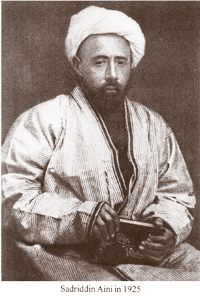
Sadriddin Aini
Sadriddin Aini (1878-1954) was one of the reformist intellectuals of Russian-ruled Central Asia (Jadids) who in the early 1920s joined the Bolsheviks to overthrow the Emirate of Bukhara and propagate the revolution in Uzbekistan and Tajikistan. As the leading Tajik (Persian-speaker) among predominantly Uzbek (Turkish-speaking) colleagues, he was instrumental in establishing a distinctive Tajik Persian language and literature, written first in Latin characters and, from 1940, in Cyrillic. Aini's voluminous oeuvre (encompassing poetry, fiction, journalism, history and lexicography), while steering safely close to Stalin's party line, helped to preserve a Tajik national consciousness that has survived the collapse of the USSR. Today it is building a post-Soviet identity through closer links with its Iranian culture and fellow Persian-speakers abroad.
Acknowledgements.
Introduction.
Reminiscences.
Author's Foreword.
Author's Introduction.
1. The Celebration.
2. After the Celebration.
3. The Halva Factory.
4. The Shifting Sands.
5. Battling the Shifting Sands.
6. In Soktare.
7. The Clever Orphan and the Wicked Landlord.
8. A Time and a Place for Everything.
9. Demons and Dragons.
10. Khaibar.
11. Usto Amak.
12. Lutfillo Giippon.
13. A new Channel for the Shofirkom.
14. The Greening of Shofirkom.
15. Schooldays.
16. Secondary Schooling.
17. Learning to Write.
18. Fasting and Breakfasting.
19. The Darveshobod Fair.
20. "Lord Provider."
21. My Father.
22. First Impressions of Bukhara.
23. The Mirakoni Khojas' Banquet.
24. Farming.
25. Plague.
26. Harvest and Aftermath.
27. Head of the Household.
28. Soktare in the 1870s and 1880s.
29. Off to Bukhara.
Appendix 1: Ahmad the Exorcist.
Appendix II: The Village School.
Glossary.
Selected Bibliography.
Illustrations.